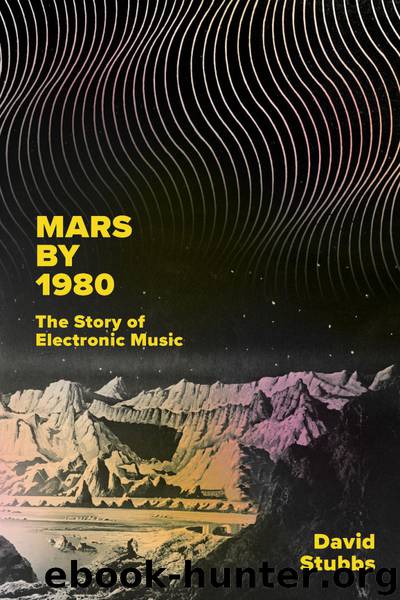Mars by 1980: The Story of Electronic Music by David Stubbs

Author:David Stubbs [Stubbs, David]
Language: eng
Format: epub
Tags: Music, History, Electronic Music, Arts, Entertainment, Non-Fiction
ISBN: 9780571323982
Google: o-BWDwAAQBAJ
Amazon: B07C885Z5X
Goodreads: 37903619
Publisher: Faber Faber
Published: 2018-07-29T23:00:00+00:00
The dusk was fast falling and my interview time with Suicide was drawing to a close. Alan Vega reflected drily on how his band seemed to be revived roughly once every ten years, enabling these ever-straitened artists to re-emerge once more. ‘Every now and then, they scrape the bottom of the barrel,’ said Vega, ‘and that’s where they find Suicide.’ The duo triggered a synthpop timeline that fetched up a long, long way from the American heartland. But they were also a touchstone for groups like the Jesus and Mary Chain and Spiritualized, rock groups who understood that Suicide represent a permanent hotspot along the long, thin electric wire that connects contemporary rock with its base element. Even Springsteen saluted Suicide’s very American rock’n’roll essentialism, the landscape of Frankies and Cherees that they drew. Any time you need to get back to first principles, you need to get back to Suicide.
At their final London Barbican concerts in 2015, shortly before Vega’s death, the singer participated in what was billed as a ‘Punk Mass’, with Henry Rollins on hand to deliver what felt like a heart-felt eulogy to the group, with the seventy-seven-year-old Vega incapacitated by a stroke. Vega rallied, movingly; one thought of all the physical pain he had willingly endured for his art, now finally taking its toll. Far more hurtful to him was the fact that Suicide had never enjoyed what he felt should have been their just commercial reward. In the early 1980s, following their second album, he had enjoyed significant commercial success – in France in particular – with the solo neo-rockabilly hit ‘Jukebox Babe’. Yet, he told me, he had been unable to enjoy it. ‘I wanted that success for Suicide.’
Suicide did have reach, though. I mentioned to him that Boy George was a big fan of the track ‘Touch Me’ and had included it on an NME top-ten playlist. This was news to Vega. He seemed visibly moved, turning to Martin Rev and saying, ‘I told you. I told you …’
Back to the Barbican, this time in 1998. Suicide had been invited to play a ten-minute set in a lobby adjacent to an exhibition of Harley-Davidson motorbikes. It was a bit of a bash, with members of Pulp, the Jesus and Mary Chain and Martin Gore of Depeche Mode among those in attendance. Vega wasn’t even sixty at this point and was still, it seemed, in his growling prime, practically eating the microphone alive, passing among an occasionally nervous crowd like a preacher seeking out a sinner to make an example of, while an impassive, visored Rev generated black, belching, remorseless volleys of power-drill electronica. It could have been 1977 or 2077.
Download
This site does not store any files on its server. We only index and link to content provided by other sites. Please contact the content providers to delete copyright contents if any and email us, we'll remove relevant links or contents immediately.
Listening Through the Noise by Joanna Demers(526)
How to Wreck a Nice Beach by Dave Tompkins(516)
Rise of The Super Furry Animals by Ric Rawlins(354)
Rise of The Super Furry Animals by ric rawlins(301)
The Rhythmic Event by Ikoniadou Eleni(290)
Developing Virtual Synthesizers with VCV Rack by Leonardo Gabrielli(286)
Kraftwerk by Uwe Schütte(216)
Mars by 1980: The Story of Electronic Music by David Stubbs(212)
